Indian Polity - Elections System
Introduction
In India, there are three levels of government, i.e.,
- Center level,
- State level, and
- Local level.
At center level, elections are conducted to elect Member of Parliament, which is known as Lok Sabha elections.
For Lok Sabha election, the whole country is divided into 543 constituencies and each constituency elects one representative as a Member of Parliament (MP).
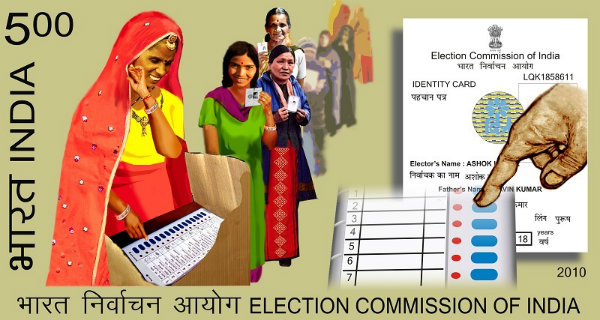
At the State level, an election is called assembly election; however, unlike center, each state is divided into a different specific number of Assembly constituencies.
The elected representative in the assembly election is called as the Member of Legislative Assembly (MLA).
Similarly, at the local level, elections are held for the election of Pradhan in Panchayat (rural) areas and counselor in Municipal (urban) areas.
Each village or town is divided into several ‘wards’ (similar to constituencies) and each ward elects one member of the village or the urban local body respectively.
Reserved Constituencies
Every citizen of India has the right to vote to elect a representative as well as to be elected as a representative.
To provide a fair opportunity to a candidate belonging to weaker sections in an open electoral competition (against those who are influential and resourceful), a system of ‘reserved’ constituency is adopted.
The reserved system ensures equal opportunity to all and provides a real choice of election to the voters from weaker sections.
Some constituencies are reserved for the people belonging to the Scheduled Castes (SC) and Scheduled Tribes (ST) in a proportion of their population in the respective regions.
In a reserved constituency, only the persons belonging to the reserved category are eligible to contest an election.
As on 1 September 2012, 84 seats were reserved for SC Category and 47 seats were reserved for ST Category in Lok Sabha.
Similarly, 33% of the seats are reserved in rural and urban local bodies for women candidates.
Voting System
The principle of a universal adult franchise is the foundation of the democracy that gives every citizen a right to have one vote and each vote should have equal value.
Every citizen of 18 years or more has the right to vote, irrespective of his caste, religion, gender, educational qualification, financial status, etc.
To ensure that not even a single person is denied of this basic right for any reason whatsoever, a list of all voters (eligible to vote) is prepared. This list is officially called as the Electoral Roll or the Voters’ List.
The voters’ list is provided to the voters of each constituency much before the election for the purpose of inspection and correction.
On the day of election, the people cast their votes as per their names mentioned in the voter list.
This method ensures that not a single person is denied his/her right to vote and thus everyone should get an equal opportunity to choose their representatives.
The government is responsible to update the voter’s list before the election; new names of all the eligible voters are added to the voters’ list and names of those who move out from their residential place or those who have been died are deleted.
A complete revision of the voter’s list takes place every five years.
Nomination of Candidates
In a democratic country, a system of free and fair election provides the people of every section a real choice to vote and a fair chance to contest. There are no restrictions on anyone to contest an election except in reserved constituencies.
To contest an election, a candidate should be of 25 years (or more) of age with sound mind and no criminal background.
Political parties introduce their candidates and give them the party ‘ticket’.
A candidate who wishes to contest an election has to fill a ‘nomination form’ and deposit some money as ‘security fees.’
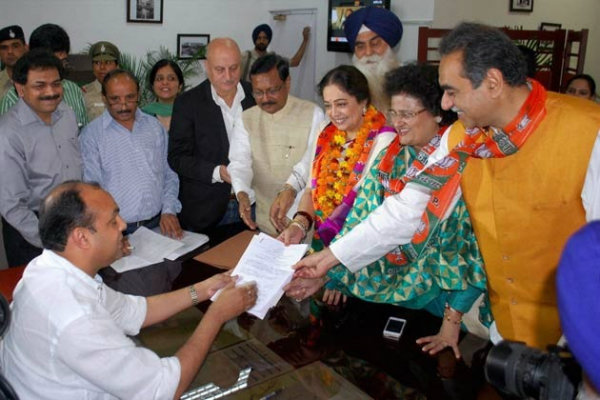
Besides, the Supreme Court has also given directions that every contesting candidate has to disclose his/her personal information to the voters. So that the voter can choose a right candidate on the basis of given information.
Following the directions of the Supreme Court, the Election Commission of India put in place a system of a declaration on an affidavit.
The proposed candidate has to make a legal declaration, giving full details of his −
Criminal cases pending against the candidate;
Details of the assets and liabilities of the candidate and his or her family;
Education qualifications of the candidate.
Educational Qualifications for Candidates
In the Indian political system, educational qualification is not required, either for the voters or for the contesting candidates.
Politics in India does not require educational qualifications of a person for selection to be a leader. It is just like the criteria for selection in a cricket team, the ability of the player to play cricket and not his educational qualification.
The essential qualification for an MLA or an MP in politics is their ability to understand people’s concerns, problems, and to represent their interests.
It is left upon the voters to decide whether their representative is qualified to understand their problems and able to solve them.
Election Campaign
The main purpose of an election is to give the people a chance to choose their representatives and make a government of their choice who frames policies to address their concerns.
During election campaigns, voters get the opportunity to have a free and open discussion about who is a better candidate, which party can give a better government, or what are their policies.
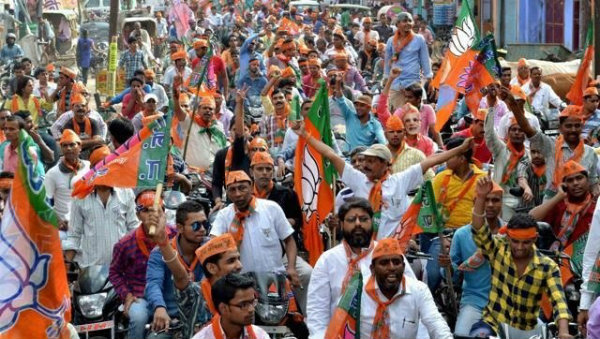
In India, election campaigns take place for two weeks period between the announcement of the final list of candidates and the date of polling.
During campaigns, the political leaders address election rallies and political parties mobilize their supporters.
The contesting candidates contact their voters through various methods such as −
They advertise in newspapers, radio, television, etc.;
They publish pamphlets and distribute them in their respective constituencies;
They arrange rallies and give speeches at every public place of their constituencies;
They tell their voters about their plan and policies and also ask about their (voters’) problems.
They try to convince their voters in their favor and appeal them to vote and elect the right candidate.
Code of Conduct
The Indian election system is based on the law, which provides a code of conduct for every person contesting an election.
If any political party or candidate violates this code of conduct, his/her election can be rejected by the court even after they have been declared elected.
This code of conduct states that no party or candidate can −
Bribe or threaten voters;
Appeal/mesmerize them (voters) in the name of caste or religion;
Use government resources for election campaign;
Spend more than Rs.25 lakh in a constituency for a Lok Sabha election;
Spend more than Rs.10 lakh in a constituency for an Assembly election.
In addition to the laws, all the political parties in India have agreed to a Model Code of Conduct for election campaigns. According to this, no party or candidate can −
Use any place of worship for election propaganda;
Use government vehicles, aircraft, and officials for elections;
Once elections are announced, Ministers shall not lay foundation stones of any projects;
Take any big policy decisions or make any promises of providing public facilities.
Any violation of any rule needs to be reported to the Election Commission, which has sufficient power and authority to take appropriate action against the violators.
Polling and Counting of Votes
The Election Commission of India prepares a timetable for election. A particular day is fixed for polling in a particular constituency. This is called election day, usually, it is declared as a holiday.
Voters whose name is on the voters’ list go to a nearby ‘polling booth’ and cast their vote one by one.
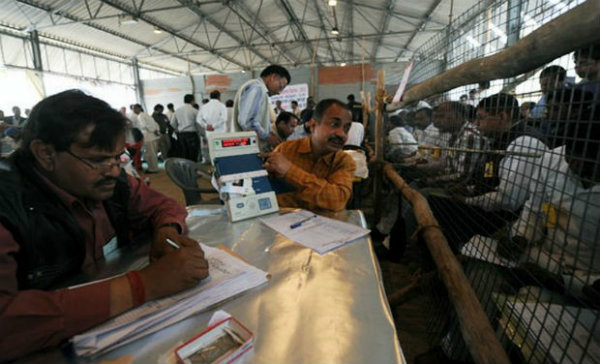
Inside the polling booth, the election officials identify the voter as per their name in the voter list (and also check their Identity Card).
After identifying the right voter, the election officials put a mark on the left hand index finger, and then allow to cast a vote.
Polling officers keep the records of those who have cast their votes and maintain a proper register.
A ballot paper is a sheet of paper comprising a list of names of all the contesting candidates along with party name and symbols.
Earlier, the voters used to mark their choice by putting a stamp on the ballot paper against the name and mark of the candidate of their choice.
Nowadays, electronic voting machines (EVM) are used to cast the votes; the machine shows the names of the candidate and the party symbols (as shown in the given image).
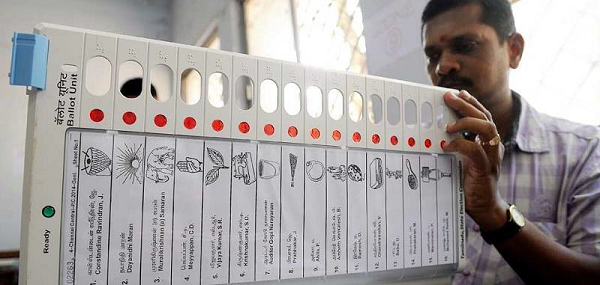
A voter needs to press the button against the name of the candidate who he/she wants to elect.
Once the polling is over, all the EVMs are sealed and taken to a centralized place where all the EVMs are kept and later on, votes were counted.
Independent Election Commission
Elections in our country are conducted through a powerful and independent institution called the Election Commission of India.
The Election Commission of India is a constitutional body which is an autonomous body independent of the government. It enjoys the same kind of independence like the judges of the Supreme Court of India.
The Chief Election Commission of India (CEC) is appointed by the President of India, but after his appointment, the Chief Election Commissioner is not answerable to the President or the government.
In a matter of election, it has been given wide powers to conduct free and fair election. They actively use these powers to form fair government.
The government or the ruling party has no occasion to influence or pressurize the election commission.
Role of Election Commission
The Election Commission takes decisions on every aspect related to the election from the announcement of elections to the declaration of results.
The Election Commission supervises and controls the administration of elections. It checks and correct any fault immediately.
The Election Commission implements the Code of Conduct and punishes any candidate or party who is found guilty of any violation.
During the election period, the Election Commission acquires powers to order the government to follow settled guidelines to prevent use and misuse of governmental power to enhance its chances to win elections, or to transfer some government officials.
All the officers and staff of the government that is put on election duty works under the control of the Election Commission and not under the government.
Acceptance of Election Outcome
The electoral outcomes in India are usually accepted as people’s verdict by the defeated candidates or party.
The test of the free and fair election in India manifested in the outcome of the election result.
In India, the result of election frequently changes the ruling government, which clearly illustrates that the elections in India are free and fair.
The ruling parties routinely lose elections in India, both at the national and state level. In fact, in every two out of the three elections held in the last fifteen years, the ruling party lost.



